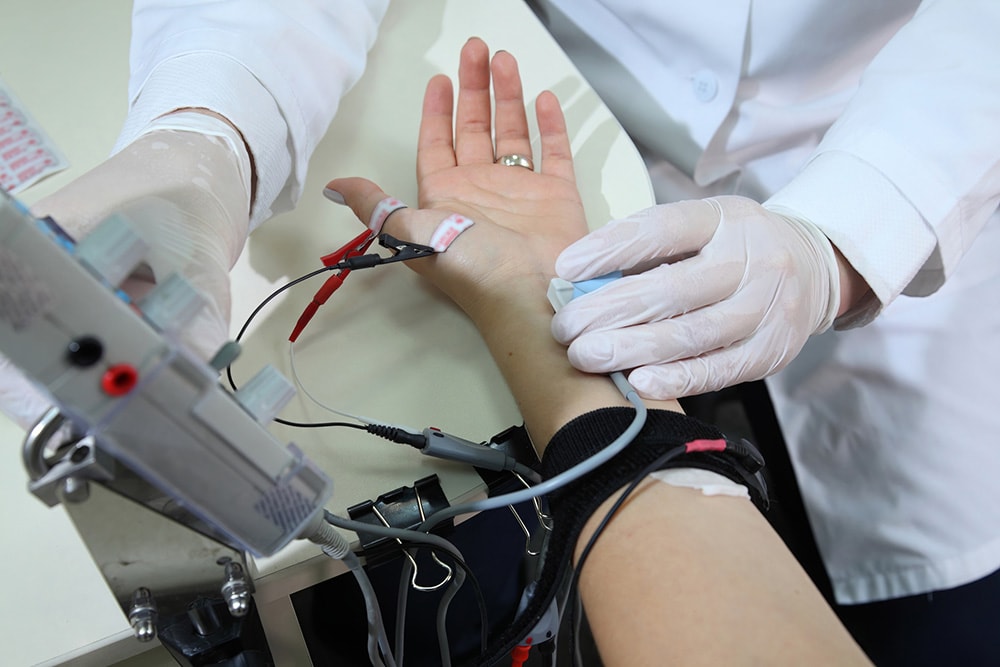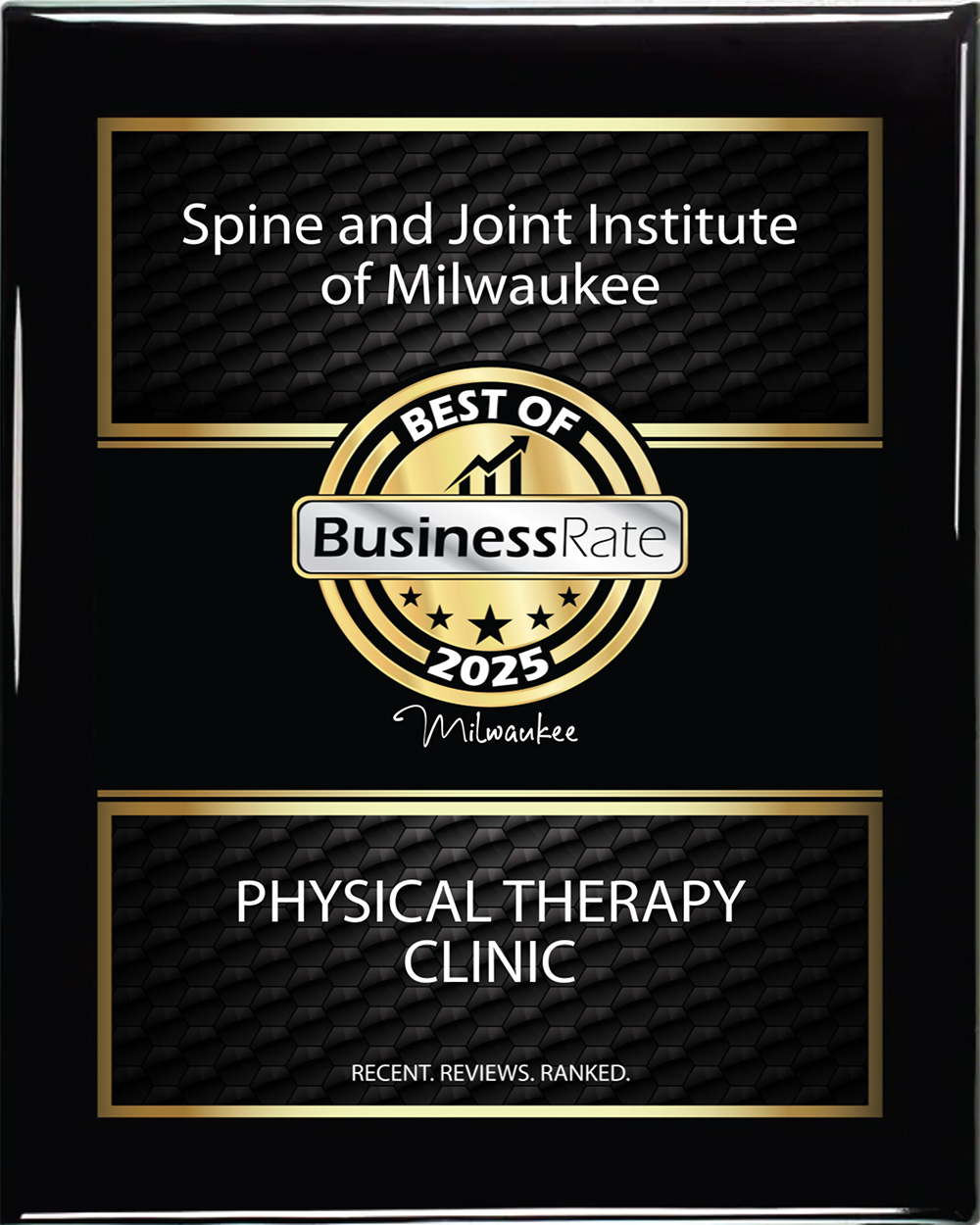Los pacientes con lesiones laborales pueden mostrar síntomas como hormigueo o entumecimiento en algunos casos. Estos síntomas pueden indicar la necesidad de realizar pruebas más específicas para evaluar los músculos y los nervios.
En Spine and Joint Institute of Milwaukee, utilizamos estudios de Velocidad de Conducción Nerviosa (VCN) para evaluar cómo el cuerpo envía señales eléctricas por los nervios. Además, utilizamos la electromiografía (EMG) para examinar las señales eléctricas que sus músculos utilizan en reposo y en uso.

La prueba de velocidad de conducción nerviosa (VCN) es un procedimiento de diagnóstico utilizado para evaluar el funcionamiento de los nervios del organismo. Durante la prueba, se colocan electrodos en la piel sobre el nervio estudiado. A continuación, se aplica un pequeño impulso eléctrico al nervio y se mide la velocidad a la que el impulso eléctrico recorre el nervio.
Los médicos pueden determinar la velocidad de conducción nerviosa midiendo el tiempo que tarda el impulso eléctrico en viajar entre dos puntos del nervio. Esta información ayuda a evaluar la integridad y la función del nervio y a diagnosticar afecciones como lesiones nerviosas, neuropatía, síndrome del túnel carpiano y otros trastornos relacionados con los nervios. La prueba suelen realizarla neurólogos o técnicos cualificados en un entorno clínico.
La electromiografía (EMG) es un procedimiento de diagnóstico utilizado para evaluar la actividad eléctrica de los músculos y los nervios que los controlan. Durante una prueba de EMG, se insertan en el músculo estudiado unas pequeñas agujas denominadas electrodos. Estos electrodos detectan las señales eléctricas producidas por el músculo cuando se contrae.
Mediante el análisis de estas señales eléctricas, los médicos pueden evaluar la salud y la función de los músculos y los nervios. La EMG suele realizarse simultáneamente con una prueba de velocidad de conducción nerviosa (VCN) para evaluar la función nerviosa y muscular.
La EMG se utiliza habitualmente para diagnosticar afecciones musculares, nerviosas, neuropatías periféricas, radiculopatías y otros trastornos neuromusculares. Suelen realizarla neurólogos o técnicos cualificados en un entorno clínico.
Durante la parte NCV de la prueba, se le colocarán electrodos en la piel sobre los nervios estudiados y sentirá un breve impulso o descarga eléctrica. Aunque esta sensación puede provocar un hormigueo o una ligera molestia, suele ser tolerable para la mayoría de los pacientes.
En la parte de EMG, se insertan pequeñas agujas denominadas electrodos en los músculos examinados, lo que puede causar una molestia temporal o un dolor similar a un pinchazo. Sin embargo, estas molestias suelen ser breves y llevaderas. A lo largo de la prueba, es posible que se le pida que contraiga y relaje determinados músculos para evaluar su funcionamiento.
Para prepararse para la prueba, debe informar a su proveedor de atención sanitaria sobre cualquier afección médica, medicación y alergia. Lleve ropa holgada y cómoda que le permita acceder a las zonas que se van a examinar y evite el uso de lociones, aceites o cremas en la piel el día de la prueba, ya que pueden interferir en la colocación de los electrodos. Llegue puntualmente a la cita y siga las instrucciones específicas que le dé su médico.
Después de la prueba, normalmente puede reanudar sus actividades normales inmediatamente. Póngase en contacto con su médico si experimenta dolor inusual, hinchazón o sangrado en las zonas de los electrodos después de la prueba. Aunque las pruebas NCV y EMG pueden causar algunas molestias, en general son procedimientos seguros y bien tolerados que proporcionan información valiosa para ayudar a diagnosticar trastornos nerviosos y musculares. Si usted tiene alguna preocupación o pregunta acerca de las pruebas, no dude en hablar de ellos con un médico de accidentes de trabajo en la columna vertebral y articulaciones Instituto de Milwaukee.

¿Se ha lesionado en el trabajo? Los profesionales médicos del Spine and Joint Institute of Milwaukee están preparados para ayudarle. Póngase en contacto con nosotros hoy mismo para dar el primer paso hacia el alivio, la recuperación y un regreso exitoso al trabajo.

Si usted o un ser querido ha sufrido una lesión laboral en el trabajo, póngase en contacto con Spine and Joint Institute of Milwaukee de inmediato. Nuestro equipo está aquí para proporcionar el apoyo y la atención que necesita para navegar por los desafíos de la recuperación de lesiones en la cabeza, mientras que la documentación de su tratamiento adecuadamente para su reclamo de compensación de trabajadores. Trabajamos estrechamente con nuestros pacientes lesionados y ayudamos a garantizar una rápida recuperación, un proceso de reclamación de indemnización laboral sin estrés y una vuelta al trabajo segura.